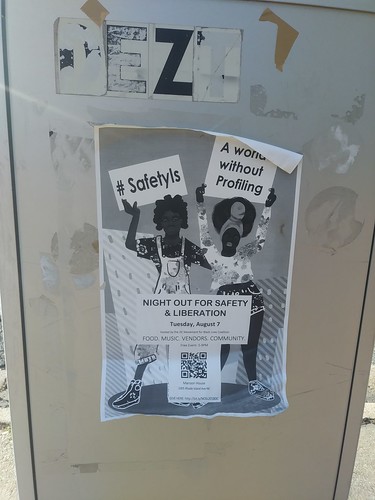Politico Magazine profile of DC AG Karl Racine | + some miscellaneous legal matters
Written by local journalist Harry Jaffe, co-author of Dream City: Race, Power, and the Decline of Washington, D.C., an important work on DC during the first Barry Administration and a great unintentional discussion of Growth Machine politics, charlie calls our attention to this profile of DC's AG, "Meet the Man Curbing Trump’s Power Without Anyone Noticing."
Karl Racine at a press conference on the Emoluments Clause case. Photo: Getty Images.
Obviously, I know about the emoluments case, where the DC AG is one of the lead plaintiffs in a case against President Trump concerning (in)direct payments from foreign governments via his property interests, something that is forbidden in the Constitution.
But the article also covers a bunch of items that I didn't know about, including how he has spurred the revitalization of the Democratic Attorneys General Association and the "nationalization" of electing Democratic AGs at the state level, something that the Republican Attorneys General Association had been doing for some time.
From the article:
But while the public has been mesmerized by Trump’s legal troubles, Racine has been quietly building out Democrats’ ability to check his administration at the state level. Without much notice, he’s quietly emerged as perhaps the single most important player in restoring Democratic clout in America’s legal system.
As D.C. attorney general, Racine is leading the ongoing emoluments suit against the president over foreign governments’ allegedly corrupt patronage of the Trump International Hotel in downtown Washington, along with Maryland AG Brian Frosh. As co-chair of DAGA, he has helped coordinate the legal and political strategies behind the lawsuits suing the Trump administration over issues including the separation of children and parents at the Mexican border, upholding the Affordable Care Act and protecting DACA recipients. And more substantial yet, Racine was the architect of one of the least-discussed but most far-reaching results of November’s elections: Democrats winning a majority of the nation’s attorney general positions—an electoral success with far-reaching implications for workers’ rights, immigration, civil rights, consumer protections and the ability to erect a judicial wall against the Trump administration.
And concerning locally-focused agenda items:
n the meantime, he’s managing 300 attorneys as the D.C. AG, focusing on work that is less publicized and more tangible in the lives of Washingtonians. His lawyers have forced landlords to repair substandard buildings, moved 1,723 children out of foster care, and gotten more than $10 million in relief to D.C. consumers. He’s also joined the leadership of the bipartisan National Association of Attorneys General, in line to be president in two years.====
Racine says his heart is in reforming juvenile justice and creating pathways to keep kids out of the criminal justice system.
Building capacity and justification for local takeover of criminal prosecution? My thing about the DC AG is the desire for the office to build the capacity to eventually be able to take over local criminal prosecution, which because of DC's status as a federal district, is the only place in the US where the Department of Justice handles this function, whereas in states, it's under the control of the state and localities. In terms of prosecution, the DC AG handles cases involving children and youth.
-- "DC Attorney General election,"2014
-- "Another wrong judgement by the Washington Post: an elected Attorney General is a good idea and should be supported," 2010
-- "Another reason to support an elected Attorney General in DC," 2009
-- "More democracy as a solution for the need for an independent Attorney General," 2007
Reshaping local criminal prosecution Post-Ferguson and #BlackLivesMatter. In the post-Ferguson environment there's been a backlash against the carceral state and the criminalization of poverty. In some jurisdictions, such as Cook County, Illinois ("Prosecutors should create innovation offices to improve justice and public safety," ABA Journal), Philadelphia ("Larry Krasner's Campaign to End Mass Incarceration," New Yorker), new prosecuting attorneys have moved their offices in a different direction.
 DC, #BlackLivesMatter, policing and prosecution. In DC #BLM hasn't been particularly successful in pushing an anti-prosecution agenda although it's had some victories.
DC, #BlackLivesMatter, policing and prosecution. In DC #BLM hasn't been particularly successful in pushing an anti-prosecution agenda although it's had some victories.A couple weeks ago, DC announced it would be moving certain gun crimes to the Federal system, to get longer sentences ("U.S. to push D.C. gun cases into federal court as Washington struggles with a 40 percent murder spike," Washington Post).
While activists have complained about this recent move, I've always been struck by how prison sentences in bigger cities like Washington tend to be "more lenient" than those handed down in suburban jurisdictions.
For example, in a case where two DC residents robbed a store owner who had a store in DC but lived in Montgomery County, they committed the crime in MoCo which gave them multi-decade sentences, whereas for other violent crimes they had committed previously but in DC and Prince George's County they received shorter sentences ("2 sentenced to over 35 years in prison each for armed robbery, shooting at Montgomery County home," Fox 5 DC; "Two Men Sentenced for Silver Spring Robbery, Shooting," Bethesda Magazine).
National politics and the US Attorney General: shouldn't the US AG be popularly elected? Plus, especially under the Trump Administration, because law "belongs to the people," I believe that the US Attorney General position should be popularly elected, with the DOJ as a separate Executive Branch agency.
Labels: attorney general, elections and campaigns, electoral politics and influence, law and the legal process, US Constitution




1 Comments:
I forgot to mention the troubling element of his involvement in local Council races. The Ward 8 and an at large Councilmember had worked for him before running for Council.
In the 2020 cycle, at least two council candidates in wards 2 and 4 had worked for the AG office. (Then again, Councilmembers had worked for the district attorney's office too, like Kenyan MacDuffie.)
https://thedcline.org/2020/05/07/jonetta-rose-barras-big-ambitions-big-spending-of-ag-karl-racine/
Post a Comment
<< Home